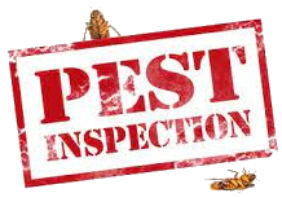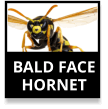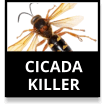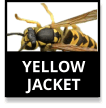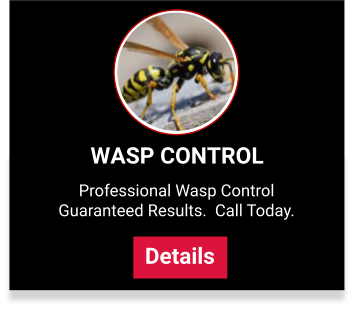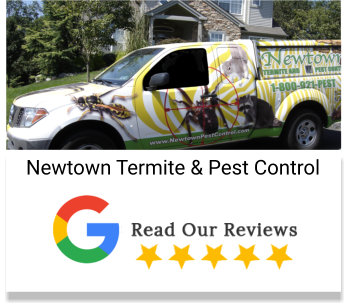YELLOW JACKET CONTROL in WARMINSTER PA
The ground-nesting wasps known as yellow jackets are likely to show up at any barbecue in large numbers. Although they frequently are confused with bees, yellow jackets tend to be far more aggressive.
From the spring to the early summer, yellow jackets may provide helpful pest control in gardens. However, as the seasons progress, the population of yellow jackets grows exponentially. The emphasis is now on eating a sugar-based diet, and with the scarcity of natural sources of food, yellow jackets transition to scavenging around garbage cans and picnic tables.
While occasionally being bothered by a yellow jacket may be nothing to be concerned about, this changes when a yellow jacket nest is located in a family's yard. Then, they become a true danger, especially to children, the elderly or anyone who is allergic to stings.
Because yellow jackets are aggressive and dangerous, control is hazardous. Accordingly, most people call an exterminator who they trust to see to removal of the nest.
WHAT DO YELLOW JACKETS WASPS LOOK LIKE?
People frequently have difficulty distinguishing yellow jackets from other species. This may be because, like other species of wasps and bees, the yellow jacket has bands of yellow and black around their abdomens. However, the yellow jacket has a much narrower waist when compared to bees, and they are not fuzzy as honeybees are. A yellow jacket queen may measure up to three-quarters of an inch long, but the workers are just one-half of an inch long.
WHERE DO YELLOW JACKETS LIVE?
The various species of yellow jacket are found across the globe, and there is a particularly dense population of them in the eastern United States. Typically, yellow jacket wasps are social insects that live in sizable colonies with thousands of individuals. The queen is the only yellow jacket that survives the winter to begin a new colony the following year.
Depending upon the species of yellow jacket wasp, nests may be either aerial or underground. Frequently, nests are attached to the eaves or overhangs of homes or from trees or shrubs. Other likely nesting sites include hollow logs, wall voids or abandoned animal burrows.
WHAT DO YELLOW JACKET WASPS EAT?
Because this species scavenges for sweet liquids and meat, they frequently come into contact with people. When foods that are meant for people are not available, yellow jackets get most of their nutrition from eating bees and flies. Carrion and fruit are other common foods as is the nectar of flowers.
When yellow jacket wasps congregate around picnic tables, they will demonstrate the most interest in soda, juice, condiments, salad dressing, meat and barbecue sauce. It is not unusual for people to be stung on or inside the mouth when yellow jackets fly into cans of soda.
DAMAGE CAUSED BY YELLOW JACKET WASPS
While they are not overtly destructive to property, yellow jacket wasps still cause problems. This is because they may build sizable nests in wall voids or attics. Yellow jacket wasps vigilantly guard these nests, which may mean an increased risk of stings for the people live in the house.
Moreover, these winged insects are known to gnaw through drywall in their effort to gain access to people's homes.
ARE YELLOW JACKET WASPS HORNETS AGGRESSIVE?
Among the most aggressive of all wasps, yellow jacket wasps are among the most aggressive of pests. This characteristic is most fully on display in the vicinity of the nest, which is why it is so dangerous to have a nest inside, hanging from or adjacent to a home.
The sting of the yellow jacket wasp is infamously painful, but they do not leave behind an embedded stinger in the way that honeybees do. Instead, the yellow jacket retains its stinger so that it can attack multiple times. A venomous fluid is injected into the victim's skin with each sting.
Swarm attacks are common when the nest is disturbed. Vibrations across the ground, such as those that are caused by a lawn mower, can trigger such an attack.
DO YELLOW JACKETS CARRY DISEASE?
Yellow jackets do not transmit diseases to people with a bite or a stinging attack. In fact, although these stings can be singularly painful, most of them are not dangerous. Victims may experience some redness, tenderness or swelling in the sting area, and these symptoms typically subside after a day or two.
Some people may develop symptoms such as wheezing or coughing, difficulty swallowing, problems with breathing, hives, dizziness, diarrhea and vomiting. These may be signs that the victim is suffering an allergic reaction. In these situations, it may be wise to call 911.
Otherwise, yellow jacket wasp stings usually can be treated with an ice pack, an antihistamine and a paste of baking soda and water to counteract the venom.
DETECTING YELLOW JACKETS
Signs of a yellow jacket wasp issue include:
- Black and yellow insects flying around garbage cans and picnic tables
- Painful stings that cause redness and swelling
- Dozens of flying insects found around a hole in the ground or a crack in a home's exterior
HOW TO PREVENT YELLOW JACKETS
To help protect against yellow jacket wasps the following steps should be taken:
- Refrain from swatting at flying insects
- Keep food covered when eating outdoors
- Look for the signs of new nests being built on the property
- Keep pet food indoors
- Eliminate access points in the homelike crevices, cracks and vents
- Use garbage cans with tight lids
- Store garbage cans well away from doors to the home and outdoor eating areas
HOW TO TREAT FOR YELLOW JACKET WASPS
At Newtown Termite & Pest Control, we use a multi-faceted approach for treating hornets and wasps that have become problematic for area homes and businesses. Our methodology involves making use of the most appropriate detection, prevention, and treatments methods available. By combining these measures, we ensure that your home or business remains free of wasps and hornets.
Schedule a FREE inspection today.


